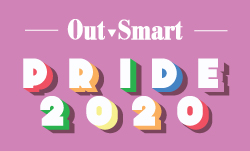
Rekindling Pride’s Activist Spirit
This new period of crisis can remind us what Stonewall was all about.

Pride was born out of crisis. At the Stonewall Inn, the harassment and marginalization of our people erupted into riots and then parades that were as much demonstration as celebration. As the AIDS crisis took its toll and Ronald Reagan looked the other way, Pride was used as a vehicle for demanding awareness and shaming a nation into action. But as the health crisis waned and acceptance grew, we reoriented Pride toward a celebration of life and community—less activism and more partying, which was a well-deserved pivot, given all that our community had endured.
Yet, we are in crisis again.
The pandemic is hitting LGBTQ people—and especially LGBTQ people of color—particularly hard because of greater economic insecurity and less access to healthcare. The Trump administration is rolling back regulations that prohibit discrimination, and the U.S. Senate refuses to acknowledge our lives. The U.S. Supreme Court is increasingly conservative and at risk of being dominated by anti-LGBTQ justices. In state legislatures across the country, including in Texas, lawmakers introduce hundreds of bills aimed at harming trans youth and preventing same-sex couples from adopting.
It is in this context that organizers are reinventing Pride for unprecedented circumstances. We are moving to virtual events by necessity, but that move provides an opportunity to rekindle the activist spirit that so often marked the first parade routes and parties. This year, we can return Pride to its origins amidst a new period of crisis. We can again see Pride as a balance of celebration and demonstration.
And there is certainly much to celebrate.
We can take pride in the many LGBTQ elected officials who are leading during this pandemic. Governor Kate Brown is implementing an ambitious plan to trace Oregonians who are exposed to the virus, and Governor Jared Polis is promising free testing for all Coloradans with symptoms. Seattle Mayor Jenny Durkan was among the first mayors to face down the virus, and her diligence and fast action saved countless lives. Tampa Mayor Jane Castor called for a stay-at-home order while the Florida governor refused action, and Madison Mayor Satya Rhodes-Conway is raising awareness about the mental health of survivors. Chicago Mayor Lori Lightfoot is highlighting racial disparities among victims of COVID-19, and her stern appeals to stay home spawned hundreds of good-spirited and educational memes.
Our LGBTQ leaders give us much to be proud of in these uncertain times.
But this moment calls for renewed activism, as well. Together, we can replace bigoted elected officials with LGBTQ leaders who can be our voice and reshape our nation’s politics. We need more LGBTQ members of Congress who can influence federal policies and vote on Supreme Court nominees. We need more LGBTQ statewide officials who can ensure our community is considered in the response to this pandemic. We need more LGBTQ state legislators who control floor debates and legislative agendas. For our community, the path out of this crisis is electing LGBTQ people and increasing our representation.
Pride Month—and the political activism it can inspire—will determine whether 2020 becomes a historic election year for our community. Seventy-two of the LGBTQ Victory Fund’s 205 endorsed candidates appear on primary ballots in June, including six candidates for U.S. Congress and 48 candidates for state legislatures. If we all get to work, we can double LGBTQ representation in the U.S. Congress, elect our first out trans state senator, and flip state legislative chambers to pro-equality majorities. In Texas alone, we have four non-incumbent LGBTQ state legislative candidates that are critical to regaining control of the state’s House of Representatives in November.
From the safety of our homes, we as a community can have enormous influence on the outcomes of these races. The time we would normally spend choosing our Pride outfits can be used to make phone calls for candidates. The money we would normally spend at the beer tents can be given to candidates to send mailers and buy digital ads that can help them reach voters. If each of us dedicates a portion of our Pride celebration time and money to electing LGBTQ candidates, we can transform America’s politics this year.
This year, Pride is not just about our community. It is about America. The unique experiences and traumas LGBTQ people face make us more compassionate, thoughtful, and determined leaders. LGBTQ elected officials are more racially diverse and more gender-diverse, and we bring those identities to every policy decision we make. Electing LGBTQ people to office will not end the pandemic or immediately stop the attacks on our equality. But these are the leaders we want to manage the fallout from this crisis—and to prevent the next ones.
While the pandemic has upended all political campaigns, LGBTQ candidates have a key competitive advantage over their straight cisgender competitors: our community. In times of crisis, we stand up and fight for each other—and we can do so once again in 2020. We have 72 chances during this Pride Month to prove the power of LGBTQ people. Let us get to work and show we can deliver.
This article appears in the June 2020 edition of OutSmart magazine.











Comments